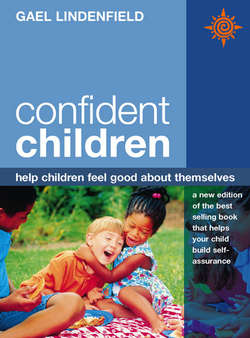Читать книгу Confident Children: Help children feel good about themselves - Gael Lindenfield, Gael Lindenfield - Страница 25
The 7 ‘sinful’ characteristics of ‘not good-enough’ parents
Оглавление1 Selfishness
wanting their children first and foremost to satisfy their needs (e.g. for love, fun, companionship or power and control)
directing their children into activities and studies so that they (the parents) can bask in their reflected glory
not being willing sometimes to sacrifice their own comforts, pleasures or ambitions for the good of their children
2 Spitefulness
using their greater physical and emotional strength or articulacy to hurt their children (perhaps because they are jealous of their achievements or youth)
preventing children from using the opportunities and resources available to them, because they themselves had to ‘manage without’ when they were their age
using children as ‘easy targets’ on whom to vent their pent-up frustration and anger
withholding praise and rewards, because they didn’t have them as children or may not be having them currently in their own lives
always having the last word in an argument
enjoying defeating their children in games
deflating children’s pleasure in their success by telling them about their own or other people’s greater achievements
3 Sanctimoniousness
always knowing what is best and unable to see that anyone else’s values could be worthwhile
being smugly sure about the meaning and purpose of life and not giving their children enough space to explore other philosophies, moral codes or religious beliefs
being unwilling to admit their own mistakes
always preaching but not necessarily practising virtue
4 Scepticism
persistently dampening their children’s enthusiasm by overemphasizing pitfalls and possible negative outcomes
being generally suspicious of people and reluctant to trust them
advising their children to view the world and their future with a cynical and pessimistic eye (perhaps suggesting too often that their plans and hopes are ‘unrealistic’ or ‘immature’)
5 Sorrow
being too full of their own unresolved hurt or grief to be able to share in and nurture their children’s natural joie de vivre
talking too longingly about the ‘good old days’
talking too frequently about the ‘if onlys’ of their lives
playing for sympathy so that their children feel obliged to care for them too much at the expense of their own welfare
clinging to their own pain and sadness to such an extent that their children feel inhibited about celebrating their own achievements
making children feel ‘obliged’ to make up for their own weaknesses and personality problems by encouraging them to be extra-assertive, prosperous or famous
6 Servility
being generally at everyone’s beck and call, and then suddenly ‘nose-diving’ into periods of burnout and bitterness
doing too much for their children and making them overdependent and insensitive to other’s needs
allowing their children to treat them with disrespect
choosing to ‘suffer in silence’ when their children would be both willing and able to give help and support
always giving the children better food, clothes, holidays and material goods than they would ever give themselves
7 Stagnation
being resistant to change and new ideas
encouraging children to ‘play too safe’ and go for easy, familiar options
leading a life which is overcontrolled by routine and regular rituals and has little opportunity for spontaneity
not making an effort to make new friends
being unwilling to travel to new places for holidays
getting stuck in a rut with their social life (e.g. always going to the same pub or watching the same TV programme)
being reluctant to update or experiment with their own image (e.g. clinging onto the same hairstyle, favourite style of shoes and ‘the only’ colour which suits them)
making fun of their children’s natural curiosity and inclination to experiment
Of course most of us are (and will always be) a mixture of both sinner and saint, and on some occasions we will look more predominantly like one than the other. That’s fine, as long as the mixture is a ‘good-enough’ blend. However, if your children are continually receiving an overdose of the sinner part of you or experiencing a confusing curdle of messages from both, you will almost certainly be damaging their confidence to some degree or other. But, before you start reaching for
Most of us are both sinner and saint. That’s fineas long as the mixture is a ‘good-enough’ blend!
the telephone numbers of psychiatrists or adoption agencies, why not try some simple self-improvement strategies? If you take some action in any of the following five areas it can only have a positively helpful effect. So for a while take the focus of your attention off your children, turn your critical (and caring) eye inwards and work through each of these following steps:
